Conflicts of interest in health care journalism. Who’s watching the watchdogs?

Ben Harder, a journalist with "US News & World Report," recently tweeted, “Pharma ads subsidize many health reporters’ salaries.”
Elisabeth Rosenthal, who now heads Kaiser Health News after a long career with the New York Times, tweeted in that same discussion, “Many of my articles in the NYT carried pop-up ads for pharma. Infuriating.”
Many journalists are aware of the drug industry’s attempts to gain positive attention by buying placement within the nation’s health care news. A few occasionally write or talk about it, as Harder and Rosenthal did publicly.
But I don’t think we talk often enough about why it matters if health care industry entities are allowed to advertise within, or sponsor, health care journalism content. Americans spend more than $3 trillion on health care. Conflicts of interest in health care and research are rampant. The Journal of the American Medical Association (JAMA) last month published a special edition all about health care conflicts of interest. JAMA included a Viewpoint article entitled, “Conflict of Interest: Why Does it Matter?” The first line: “Preservation of trust is the essential purpose of policies about conflict of interest.”
But who talks about conflicts of interest in health care journalism? In a Gallup poll, “Honesty/Ethics in Professions,” respondents rated journalists’ honesty and ethical standards below psychiatrists, chiropractors and bankers….and just above lawyers.
There is great potential harm in a further erosion of trust in journalism and in health care. There is a great potential harm in journalists – and the audience they serve – becoming numb to the presence of and influence of drug companies and other industry entities in the news and information disseminated to the public. There is, as we have begun to point out repeatedly in our review of news stories and PR news releases, advertising and marketing messages, often a polluted stream of contaminated information reaching the public. Often vested interests pollute that stream. (We will discuss these potential harms in more detail in part 3 of this series.)
That’s why I think that this issue demands and deserves a deeper dive. Why now? Because, as outlined in this series, there are a growing number of questionable alliances between a growing number of news organizations and health care industry sponsors. Money is exchanging hands and I ask “Why? Why do news organizations enter into these arrangements? Why do they feel they need to? Have they exhausted all other options?” I want to shine a light on a collection of news organization practices. I’m raising the same types of questions that journalists often raise as they report on various issues. But I’m asking them because I don’t see enough journalists talking about it when their own organizations accept industry money.
A trail of tainted funding
We have written many times about the National Press Foundation (NPF) offering all-expenses-paid trips to health care journalists for workshops that are sponsored by drug companies (or by Coca-Cola).
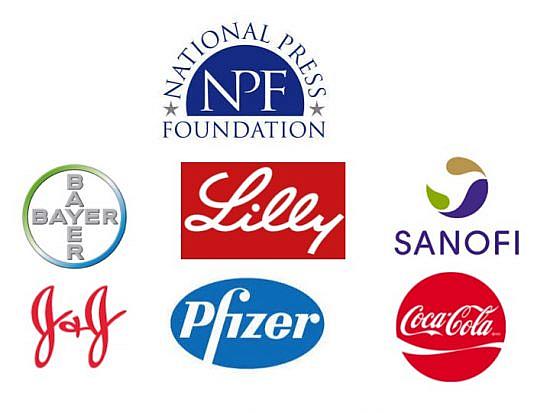
We have written twice about how STAT has accepted sponsorship from the industry group, the Pharmaceutical Research and Manufacturers Association (PhRMA). They have also accepted sponsorship from individual drug companies, from health care providers and other health care industry entities. See articles by Trudy Lieberman and, later, by me.
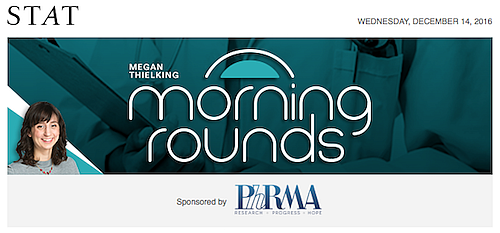
Vox sends out a daily newsletter sponsored by an arm of PhRMA, America’s Biopharmaceutical Companies. Criticism of this deal was tweeted by @AllOnMedicare: “The ‘wonks’ of @voxdotcom are too naive to understand how problematic it is for @PhRMA to pay their bills and salaries” and “Is this a joke? Do you not see how this kills any credibility you might have with health journalism? @PhRMA is a powerful lobby.”
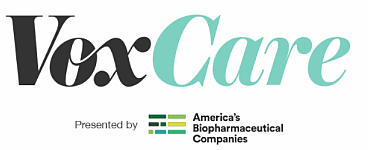
NPR lists PhRMA as a supporter.

This October the World Conference of Science Journalists will meet in San Francisco, with several big bucks drug company sponsors. Johnson & Johnson is currently the top donor, at $400,000. Bayer gave at least $50,000. Nearly a half million just from two drug companies.

It would require a much longer piece to outline ethical issues swirling around some women’s magazines – often on matters of health or health care. A few years ago science journalist Hilary Rosner wrote,”Their So-Called Journalism, or What I Saw at the Women’s Mags,” on a PLoS blog:
“There are some serious institutional problems, and these can lead to 1) lack of coverage of important topics, 2) less-than-completely-truthful coverage of important topics, and 3) complete and utter bullshit coverage of important topics. …The problem is that they also happen to run stories that are ostensibly ‘journalism.’ And they employ fact-checkers and have supposedly strict editorial guidelines about what sources are acceptable and what materials you must provide to the fact-checking department and so on. But if the whole question of what stories make it into the mag to begin with is determined by what will be acceptable to advertisers, then you’ve already kind of ditched your journalistic integrity. And if you’re going to tell your writers what you want them to say from the get-go, and then change their quotes (or other things) at will, then why bother employing fact-checkers? I think the problem lies in pretending to be something other than a vehicle for advertisers.”
Local television news has, at times, been a cesspool of troubled advertising, sponsorship and content-sharing deals with vested interests in the health care industry. We’ve written about these issues more than 15 times but this is such a firmly-entrenched practice that we’re not sure that another 15 articles would do any good.
“I felt duped by the organizers”
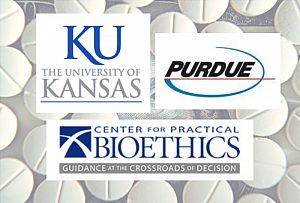
Some who teach journalism – if they lead by example – are not giving the best example for their students and for the public. We broke the story about a University of Kansas journalism project that has ties to Purdue Pharma, makers of OxyContin.
Another campus, another issue. Paul Thacker wrote in The BMJ about the University of Colorado accepting Coca-Cola money to sponsor a health journalism workshop on obesity. MinnPost.com published a good summary. Thacker wrote:
“The tactic bore fruit. In one example, a CNN reporter attended the 2014 journalism conference and later contributed to a story that argued that obesity’s cause could be lack of exercise, not consumption of sugary soft drinks. Critics told The BMJ that Coca-Cola’s $37 000 support for that particular conference and the resulting story was a better bargain than an advertisement placed on CNN’s website.”
But, to come full circle, Thacker also reported on the National Press Foundation – about whom we began this piece – being involved in an earlier University of Colorado health journalism workshop that received Coca-Cola support. Thacker captured this:
“I feel like I was lied to,” (then-journalist Kristin) Jones told The BMJ. Jones no longer works as a journalist but said that she would not have attended the conference had she known of Coca-Cola’s funding.
Trudy Lieberman wrote for us about her conversation with Lauren Sausser, who reports on health care for the Charleston, SC Post and Courier newspaper. Sausser attended a National Press Foundation obesity workshop in May 2013 at the University of Colorado. A year later, she signed up for, but then backed out of, another National Press Foundation cancer news workshop that was sponsored by Bayer. Lieberman quoted Sausser:
“I would not accept lunch from a local hospital so why would I accept a hotel and airfare from a drug company.” She said she didn’t notice Bayer’s funding until she was accepted. “I said thanks but no thanks. I was uncomfortable accepting the free trip.” She said the Foundation had told her that “while Bayer is funding all costs for the program, they have no input into content and do not have any say in who we choose as speakers.” But sometimes, Sausser told me, “The conflicts are hidden and sometimes they are just not clear.”
Recently, Sausser reflected on Twitter: “I felt duped by the organizers.”
Paul Thacker wrote:
The (National Press) foundation is now run by Sandy Johnson, who said by email that “a more appropriate sponsor of a journalist training program would be an organization such as Mayo Clinic, which did just that in February 2016.”
But would the Mayo Clinic be a more appropriate sponsor for a journalist training program? We will look more closely at an example in part 2 of this 3-part series tomorrow.
Points of emphasis
I wrap up this introductory overview by emphasizing a few things.
- The three news organizations (STAT, Vox, NPR) mentioned earlier for accepting PhRMA sponsorship are three that I respect and admire as much as any in journalism. I may be naive, but I do not believe they would allow sponsorship to influence editorial decision-making. However, it is because of the pedestal that I put them on that I expect and wish for a better example. Why did they feel compelled to accept support from an industry lobbying group whose members and whose members’ products they cover on a regular basis? Would these organizations accept political news coverage sponsorship from the Trump 2020 campaign or from any other politician? Would these organizations accept public health/tobacco control news coverage sponsorship from The Tobacco Institute? I don’t think so. But in health care news, some news organizations look the other way or directly solicit such support. It is tone deaf, a terrible example, and should raise questions in the minds of news consumers and health care consumers. It leaves a cloud of doubt hanging over the news – and that is a problem. With all of the spurious attacks on journalism – one need look no further than the current White House occupant – you would think that journalists would do everything possible to avoid raising more doubts about conflicted news.
- You could say that these organizations should be concerned about the potential for, or the perception of, a conflict of interest. But an important Viewpoint article in that recent Journal of the American Medical Association special edition on conflicts of interest in health care was entitled, “Why There Are No ‘Potential’ Conflicts of Interest.” The authors argued that distinctions between perceived/potential conflicts and actual conflicts are “misguided.” A conflict of interest, they posit, “describes a situation in which there is a risk of bias and resulting harm, not a situation in which bias or harm necessarily occurs. Thus, a situation marked by risk of bias from a secondary interest is no less a COI because it does not result in bias or harm.” There is a polluted stream of health care news and information to the public and any source of the pollution should be eliminated.
- Some news organizations might say, “Well, do you want us to go out of business?” That is a false dichotomy; it is not a choice between only two alternatives of “Take conflicted money or go out of business.” Have news organizations that accepted pharma funding first exhausted possibilities for foundation support? Kaiser Health News and ProPublica are two outstanding journalism efforts that depend on foundation funding. I know that may raise another set of issues about intellectual conflicts in foundation funders – a topic for another time. Instead of taking drug company money, have these organizations pursued other sponsors that have health-related product lines that they’d like to advertise? FitBit, Nike or any other sports shoe/sportswear manufacturer, LifeTimeFitness or any other fitness center chain? I could keep an advertising department busy with a much longer list.
- Our publishing effort doesn’t accept pharma money. We don’t accept any advertising. We’ve survived for 11 years solely from philanthropic foundation support. I’d shut this project down before I’d take drug company money. I went 19 months without funding. I turned down an invitation to speak at the Aspen Ideas Festival this summer because the organizers accept drug company support. I once resigned my position as the head of the CNN medical news unit because of evidence of sponsor influence on editorial decision-making that occurred over my head and behind my back. So I don’t just talk the talk; I walk the walk.
- I welcome comments and encourage a dialogue about these issues but, true to our Comments policy on this site, we will not post any ad hominem attacks. Read our policy before you leave any comments. We didn’t make any personal attacks. In fact, we state our deep admiration and respect for some of the news organizations we mentioned. So please shine light rather than shed heat. Our goal in writing about these topics – which few others have chosen to ever address – is to find solutions and to help navigate the polluted stream that now exists.
This article was originally posted on HealthNewsReview.org and is republished here with permission. Gary Schwitzer is HealthNewsReview.org's publisher. He tweets at @garyschwitzer.
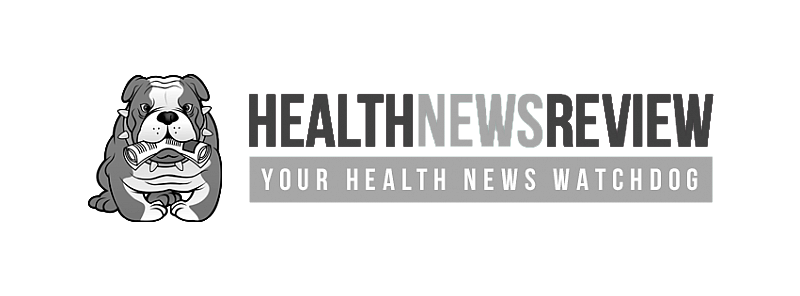
[Photo by Chris Potter via Flickr.]

